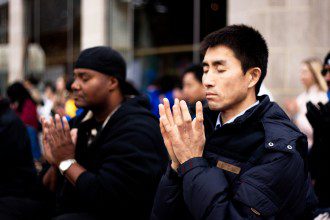Contributing Writer for Wake Up World
“Hatred cannot coexist with loving-kindness, and dissipates if supplanted with thoughts based on loving-kindness.” ~ from the Dhammapada (Buddhist scripture)
Science has just confirmed the Buddha’s teachings in a recent study published in the online journal ‘Motivation and Emotion’. The study, conducted by researchers at the University of Sussex (UK) was designed to measure the effects of practicing a Buddhist meditation called Loving-Kindness-Meditation (LKM) for seven minutes, on levels of racial prejudice.
Lead researcher Alexander Stell, a Doctoral student in Psychology, said: “We wanted to see whether doing LKM towards a member of another ethnic group would reduce the automatic preference people tend to show for their own ethnic group.” The meditation used in the study, seven minutes of love and kindness, is a Buddhist one that aims to promote feelings of empathy and compassion.
[pro_ad_display_adzone id=”110028″]
According to the Buddhistcentre.com, “the original name of this practice is metta bhavana, which comes from the Pali language. Metta means ‘love’ (in a non-romantic sense), friendliness, or kindness: hence ‘loving-kindness’ for short. It is an emotion, something you feel in your heart. Bhavana means development or cultivation.”
During the short meditation the subject projects feelings of love and kindness, first on themselves and then onto another person. Proponents of LKM, who are now supported by the findings of this study, claim that the meditation promotes attitudinal changes by cultivating feelings love and acceptance that start with the self and then spill out to ‘other’.
The study used a sample group that was comprised of 71 Caucasian non-meditating adults. Each of the participants was given a photo of a person of colour of the same sex. One group was then asked to practice LKM while focusing on the subject in the picture. The other group, were also given a photo, but were not provided with a meditation assignment. Instead they were told to study the image and look at certain facial features. Both groups were told to engage in their tasks for seven minutes.
The researchers used a test called the Implicit Association Test to measure reaction times of the participants who were instructed to match positive and negative word associations with their own or another ethnic group.
On average people tend to identify positive terms with their own racial group, and negative ones with the group perceived as the ‘other’. This method of measurement is deemed to be more reliable than traditional questionnaire data, in which peoples’ responses tend to be swayed by social desirability. The results showed that the participants in the meditation test group were significantly quicker to associate positive stimuli with the racial group of the person in the photograph that they used as the subject of the meditation session. Unfortunately there was no reduction in racial bias that extended to other racial groups.
It is particularly interesting to note that the study also looked at the effect of meditation on qualities like gratitude and awe, which generally relate to others, as well as more self-directed qualities like contentment, pride and joy. An increase in all these positive qualities was found among the meditating participants, with an emphasis specifically on the ‘other’-focused emotions.
Mr. Stell stated: “This indicates that some meditation techniques are about much more than feeling good, and might be an important tool for enhancing inter-group harmony.”
These findings are of particular importance to us today because as the world experiences increasing unrest, with a divide and conquer agenda being pushed by those at the top, strategies to promote peace and tolerance in the wider community are more important than ever.
Though racist feelings are learned and not inherent, they are unfortunately more common than most of us would like to believe. Racism is subtly, and often not so subtly, built into our culture. We see it in the streets, in movies, on television, at school, in books; it permeates society like a systemic disease that we might not even be aware is affecting us. Feelings of inferiority or superiority might unconsciously colour our perspective of reality and influence the way we engage with it.
“Loving Kindness and Compassion are the basis for wise, powerful, sometimes gentle, and sometimes fierce actions that can really make a difference in our lives and others.” Sharon Shalzberg
Unfortunately, I doubt many the hardcore racists and other bigots — like those seen in reactionary anti-Muslim protests to the recent Paris violence — will be adopting this practice anytime soon. But each of us who wants to, can make a difference. Every person who takes responsibility for their energy can use this simple technique to help create vital change in our collective shared reality by cultivating more love, tolerance and awareness for all. And by introducing meditation into schools, we have a powerful means of avoiding people developing racial prejudice in the first place. Just imagine how future generations of children might benefit!
“If every eight year old in the world is taught meditation, we will eliminate violence from the world within one generation.” ~ Dalai Lama
The Loving Kindness Meditation
In order to take advantage of the Loving Kindness Meditation’s capacity to shift negative feelings towards others, try these simple methods:
- Start by bringing your awareness to yourself
- Focus on positive relaxing feelings
- Try to connect with your heart and cultivate feelings of love
- When you feel ready, imagine someone else and project the same loving energy onto them (it might be useful to begin by imagining a friend, and then over time as you become better at the practice, try focusing on people you are less comfortable with).
Extra tips:
- Because our imaginations are such potent tools for altering our internal landscapes, visualisation can be very valuable for this meditation. Include as much detail as possible when imagining the scenario. For example, you might picture love pouring out from your heart, flowing out to your focus subject.
- Try to develop the feelings as much as possible. Try to think of many positive qualities and attributes about the person as you can.
- Use verbal statements and affirmations. Repeating positive assertions helps ensure they penetrate the deeper levels of our unconscious where they will have maximum impact.
Reference:
Previous articles by Christina Lavers:
- New Study Shows Regular Contact with Nature Reduces Crime, Increases Social Cohesion
- Research Shows Just 7 Minutes of Meditation Can Reduce Racial Prejudice
- Groundbreaking Study Maps the Decline of Wild Bee Communities in the United States
- More Evidence That TV is Dumbing Us Down
- Taking Care of Our Inner Tribes – Microflora, Awakening and You
- Taking Responsibility For Our Energy
- Discernment – Navigating The Spiritual Minefield
- TV: Cutting the Cord
- Heart Aligned Eating: Beyond Dietary Absolutes
- The Art Of Failing Well
About the author:
Christina Lavers is a writer, an artist, a creative enthusiast, and an inner world explorer. Born in Montreal Quebec Canada, she now lives with her life partner and son in a rainforest pocket in the hills behind Coffs Harbour, NSW Australia. She spends her time playing, creating, growing and sharing.
“My journey has been about personal alchemy… exploring the mysteries of my soul and my environment, and learning to bring all aspects, the light and the dark, together with the transcending ingredient… love. The more I uncover and nurture the wounded aspects of my being, the more whole and grounded I feel and the more my outer world reflects the love, wonder and magic I have discovered inside”.
Christina is devoted to assisting people to find and connect with their own creative magical current that flows deep within. She is now offering a comprehensive e-course designed to help people light up their world with passion and creativity. You can access Section One here for free!
Christina has recently published her first full length book, a memoir about her wild awakening journey entitled Jump Into the Blue, and she is currently working on the next one.
You can follow Christina’s work at:
[pro_ad_display_adzone id=”110027″]










